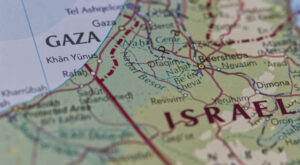The U.S. Department of State released last week its annual report on religious freedom in the world, which shows persistent levels of deep-rooted anti-Semitism in the Middle East, including two neighboring Arab countries with whom Israel has peace treaties.
The main sources of persecution vary among countries, with Iran spearheading the group of regime-driven incitement against the Jewish people, while Jordan, Egypt and Qatar face criticism in the report for allowing the widespread expression of anti-Semitic sentiments in private and state-owned media with impunity.
Regime-driven persecution: Iran
The Islamic Republic of Iran is classified as a “Country of Particular Concern” under the 1998 International Religious Freedom Act. Both the U.S. Department of State and the U.S. Commission on International Religious Freedom list Iran as one of the worst religious freedom violators in the world. Since President Hassan Rouhani assumed office in 2013, religious freedom in the country has continued to decline due to intensified harassment, imprisonment, and execution of religious minorities, including Jews.
Iran has the Middle East’s largest Jewish population outside of Israel with an approximately 20,000-member community, which faces harsh conditions in the Islamic Republic. The Supreme Leader, Ayatollah Ali Khamenei and state-run television continue to foster a climate of hatred, propagating anti-Semitic rhetoric and demonizing the country’s Jewish community for real or perceived ties to Israel.
On June 30, 2016, the Kayhan newspaper, managed by a board appointed by Khamenei’s office, published an article claiming that the Holocaust was a myth and product of Jewish historians’ imaginations. Moreover, “Death to Israel” is a prominent chant heard at regime-sponsored rallies, such as on annual Al Quds day, and religious minorities, including Baha’is and Christians, are accused by the regime of collusion with Israel.
The U.S. Department of State writes in its report that “Government officials continued to employ anti-Semitic rhetoric in official statements and sanction them in media outlets, publications and books,” adding that “On January 27, [2016,] International Holocaust Remembrance Day, Iranian Supreme Leader Ali Khamenei’s official website posted a video that questioned whether the Holocaust happened and criticized the U.S. and European governments for disapproving of Holocaust denial.”
In 2015 and 2016, Iran hosted a Holocaust denial cartoon contest. The organizers behind the event—Iran’s House of Cartoon, the Owj Media & Cultural Institute and the Sarcheshmeh Cultural Complex—are directly linked to and funded by the Islamic Revolutionary Guard Corps. On April 29, 2016, the U.S. Holocaust Memorial Museum confirmed the Iranian regime’s partial funding of the contest, saying in a statement that “the organizations associated with the contest are sponsored or supported by government entities, including the Islamic Revolutionary Guard Corps and the Ministry of Islamic Guidance.”
Media-driven Persecution: Egypt, Jordan, Qatar
In Egypt, Jordan and Qatar, the main source of anti-Semitic propaganda is private and state-owned media. These outlets operate with the passive support of governments, which routinely fail to condemn and prosecute incitement against the Jewish people.
Despite the peace treaty with Israel, the Egyptian government generally took no action against anti-Semitic cartoons and commentary demonizing Jews and Israel, which regularly appeared in state-owned and private media. They also failed to condemn academics, cultural figures and clerics, who appeared on these outlets to spread anti-Semitic tropes and hatred against the Jewish people.
The U.S. Department of State writes in its report that “in May, lawyer and political commentator Nabih Al Wahsh appeared in a television interview during which he accused Israel of shooting down Egypt Air flight 804 with a missile and of ‘exporting AIDS, aphrodisiac bubble gum and all kinds of catastrophes’ to the country.” It was further noted in the report that Al Wahsh “called on ‘any Egyptian or Arab man who comes across an Israeli person to kill him and mutilate his body’ and for ‘death squads to hunt down any Israeli anywhere in the world,’ according to the Middle East Media Research Institute.”
Furthermore, in May and June 2016, the state-owned newspaper Al Ahram published a five-week series of articles based on stereotypical anti-Semitic conspiracy theories. Jews were accused of “plotting to enslave the world,” “claiming that their religion is the only religion,” “inventing atheism,” “leading countries to religious and political extremism” and staging an “economic takeover of the world.” Most of these allegations of “evil” referenced the long-debunked protocols of the Elders of Zion.
There was some positive coverage of the country’s Jewish community. On May 30, an interview aired on state television, recorded in one of Cairo’s remaining synagogues, with the president of the Cairo Jewish community. During the exchange, she spoke about the religion of Judaism and corrected what she said were misconceptions about the Jewish community in the country.
Meanwhile, societal anti-Semitism remains persistent in Egypt. Copies of anti-Semitic literature, including translations of Mein Kampf, were widely available for purchase in shops across the country.
In Qatar, private media continued to publish anti-Semitic material. In Jan. 2016, the newspaper Al-Sharq printed an editorial entitled “The Jewish Personality,” which labelled the “Jewish problem” as the “most dangerous and complex in the modern era” and described the “Jewish personality” as “distorted and malevolent” and an “imminent danger threatening the Islamic nation.”
In June, the same newspaper published an anti-Semitic poem entitled “The Plot of the Jews,” which accused Jews of corruption and malevolent intention against Muslims. The Qatari government took no action against the outlet, despite legislation which explicitly prohibits defamation against Judaism.
A similar problem persists in Jordan, another Arab neighbor that signed a peace treaty with Israel. The U.S. Department of State concludes that “cartoons, articles, postings on social media and public statements by politicians continued to present negative images of Jews and to conflate anti-Israel sentiment with anti-Semitic sentiment.” The report also criticized the Jordanian government for taking no “action with regard to anti-Semitic material appearing in the media.” {eoa}
This article originally appeared at worldisraelnews.com.
See an error in this article?
To contact us or to submit an article






















